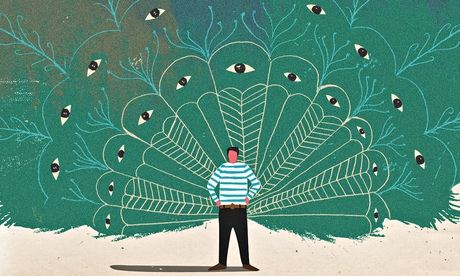
According to a new Canadian study, it's more emotionally damaging to be ignored in the workplace than bullied. This finding raised some eyebrows: after all, bullying's an overtly hostile act, whereas we're taught from childhood that turning a blind eye to those we can't stand is the civilised thing to do. For a simple explanation of this seemingly odd result, I refer you to the path-breaking psychologist Oscar Wilde: "There is only one thing in the world worse than being talked about, and that is not being talked about." Workplace bullying can be awful, but it does have one rather cheerless payoff: at least you can be certain that people think you're worth bullying. The ignored person (ignoree?) lacks even that chilly solace. I've often wondered why would-be standup comedians subject themselves to hecklers at open-mic nights, but perhaps that's the reason. Nobody would choose an audience of drunken hecklers; on the other hand: an audience!
One person that study wouldn't have surprised is Idries Shah, the Indian-born philosopher who died in 1996. Beneath almost everything humans do, he argued, lay an unacknowledged motive: the "attention-factor". The theory is, we need attention almost as desperately as food and warmth, but don't realise it, so we fail to understand that many everyday encounters "are in fact disguised attention-situations". In a business negotiation, you might think your only motive is to win; in an argument with a spouse, you might believe your primary goal is to get the other person to change. Yet in both cases you might really be motivated by trying to satisfy your unmet need for attention.
Crucially, "attention may be 'hostile' or 'friendly' and still fulfil the appetite for attention". A bad-tempered fight between friends is still a form of engagement: in the very act of fighting, each is acknowledging that the other matters. Since Shah's death, research has backed him up: neuroscience suggests that social isolation affects the brain similarly to physical pain, while ostracism has been identified as a key factor in some of the bloodiest US school shootings. Are mass murders sometimes a horrifyingly destructive attempt to remind the world the murderer exists?
Our failure to understand our need for attention routinely lands us in trouble, Shah believed, because it leaves us at the mercy of anyone, however unpleasant, who's willing to bestow some. When people feel ignored, a political leader who makes them feel acknowledged will acquire their support, even if he's an egomaniacal tyrant with no plans to improve their lives. A controlling or otherwise abusive partner will doubtless pay you plenty of attention, even as he or she destroys you. Worse, you'll be predisposed to believe it when you're told it's for your own good: when people lack the attention they require, Shah wrote, "they are vulnerable to the message which too often accompanies the exercise of attention towards them".
We think of "attention-seeking" as a character flaw. Start to see it instead as a universal need – met in healthy or unhealthy ways – and all sorts of things fall into place: celebrity meltdowns and internet trolling, but also many of your partner's or your colleagues' otherwise inexplicable quirks. (Or your own.) Life is an open-mic night, and we're all just trying to get noticed.
• oliver.burkeman@theguardian.com, twitter.com/oliverburkeman

